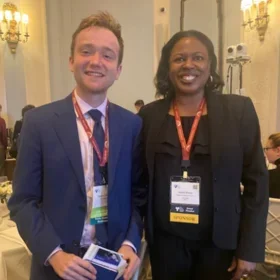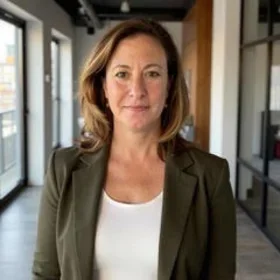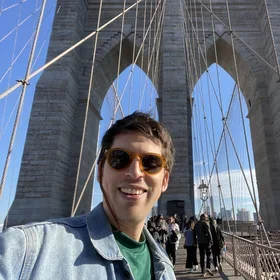The Yazidis are a religious and ethnic minority predominantly located in northern Iraq, and one of the oldest communities indigenous to the Middle East. As practitioners of their own religion, Yazidis have faced persecution and violence throughout their history. Following the U.S.-led invasion in 2003, sectarian violence erupted throughout the country, culminating in a brutal 2014 attack by the Islamic State of Iraq and Syria (ISIS), which various UN bodies have since declared a genocide.
On a recent visit to Columbia University's Negotiation and Conflict Resolution (NECR) program, Nobody’s Listening producer Ryan D’Souza took time off from managing an exhibit on the Yazidi Genocide at the United States Institute of Peace in Washington, DC, to share a virtual reality (VR) experience with NECR students and co-facilitate a debrief of the workshop with NECR Associate Professor of Practice Peter Dixon.
Ryan worked with director Mary Matheson and a team of filmmakers, experts, psychologists, and a global organization of Yazidi survivors to create a 12-minute film that brings viewers into a Yazidi village through VR, an innovative and quickly developing medium that has only recently been utilized in response to conflict.

A pair of screen captures display scenes that students from the Negotiation and Conflict Resolution program experienced during the Nobody's Listening virtual reality demonstration.
During their debrief, students reflected on the role of new technology in conflict resolution, the importance of crafting resolution strategies informed by emotion, and the challenge of depicting the true horror of violence when trying to build empathy:
“This was my first experience with the VR experience, and it was incredibly impressive and overwhelming. As I gazed at the sky and the leaves, and heard the voices of the victims as if they were right beside me, it made me feel as though I was actually in a city ravaged by war. In conflict resolution, I am intrigued by the potential application of VR in mediation. I wonder if VR could be utilized to present the narratives of different parties to effectively illustrate how they perceive the world. This immersive presentation might enhance mutual understanding and open up avenues for exploring more integrative solutions.” —Sydney Wang
"The VR experience was unique and served as an effective tool to educate users about conflicts and showcase the state of the region after the conflict. It elicits a strong sense of empathy due to its interactive and immersive nature. Users can interact with the images and listen to the stories of survivors through narration while experiencing the VR.” —Nataliya Donchenko
"The experience was definitely immersive and impactful. It also raised a crucial question regarding resource allocation: In fields like international relations and conflict resolution, where resources are scarce, the utility of technology must be carefully weighed. While VR can efficiently brief decision-makers who require quick, impactful information, for the general public, the same resources allocated differently might achieve broader engagement and awareness. Ultimately, the choice of using VR hinges on the specific objectives one aims to achieve.” —Jerome Crettol
“The VR experience was exhilarating and, at the same time, overwhelming. It made the experiences of the Yazidi community palpable. It placed me in the scene where I watched and listened to the voices of the survivors as each scenario was played. Nobody’s Listening manages to give a glimpse of the atrocities, loss, and pain of the survivors with poignancy and without the use of explicit violence. It breaks the emotional and intellectual distance that a person may have towards the atrocities prior to experiencing the VR. … The VR experience's biggest strength is its ability to evoke emotion. However, emotions can be tricky. The task is then to understand how complex emotions such as betrayal, guilt, resentment, and disbelief can be constructively managed amongst community members, who once co-existed peacefully prior to engaging in violence against each other.” —Lakshmi Ravindran
About the Program
Columbia University’s Master of Science in Negotiation and Conflict Resolution prepares students to analyze the root causes and dynamics of conflict and to transform disputes through reasoned and resourceful interventions. The program focuses on developing self-awareness, tenacity, and interpersonal competency; building common ground; opening lines of communication; ensuring representation and recognition, and building sustainable possibilities for resolution.


